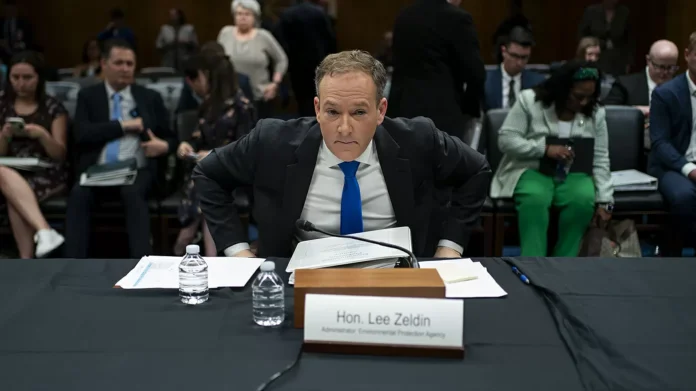The Environmental Protection Agency (EPA) has long been known as the leading authority in protecting our environment from harmful pollutants and promoting sustainable practices. However, recent developments have raised concerns about the agency’s stance on climate change and its commitment to protecting our planet. EPA Administrator Lee Zeldin’s recent announcement that the agency will propose to repeal the 2009 endangerment finding has sparked outrage and raised questions about the EPA’s philosophy on climate change.
The endangerment finding, issued in 2009, declared that greenhouse gases, including carbon dioxide, pose a threat to public health and the environment. This finding was a crucial step in the fight against climate change, as it provided the legal basis for the EPA to regulate carbon emissions from power plants, factories, and other sources. However, Administrator Zeldin’s statement indicates a shift in the agency’s approach to climate change, one that embraces a philosophy of denial and seeks to upend existing regulations.
This proposed repeal of the endangerment finding is a cause for concern for several reasons. Firstly, it goes against the overwhelming scientific evidence that shows the detrimental effects of greenhouse gases on our planet. Climate change is not a myth or a political issue; it is a scientific fact that is supported by data and research from around the world. By denying this reality, the EPA is not only ignoring its own mission to protect the environment but also putting the health and well-being of the public at risk.
Secondly, this move by the EPA is a clear indication of the agency’s lack of commitment to addressing the pressing issue of climate change. The endangerment finding was a crucial step in the fight against climate change, and its repeal would not only hinder progress but also send a message that the EPA is not taking this issue seriously. This is especially concerning as the effects of climate change, such as extreme weather events, rising sea levels, and loss of biodiversity, are already being felt around the world.
Furthermore, the proposed repeal of the endangerment finding raises questions about the EPA’s priorities. Instead of focusing on protecting the environment and public health, the agency seems to be more concerned with appeasing the interests of the fossil fuel industry. This is a dangerous path to take, as it puts corporate profits above the well-being of our planet and its inhabitants.
It is also worth noting that this is not the first time the EPA has taken steps to undermine climate change regulations. In 2017, the agency announced its intention to roll back the Clean Power Plan, which aimed to reduce carbon emissions from power plants. This move was met with widespread criticism and legal challenges, and it is concerning that the EPA is now seeking to further dismantle climate regulations.
In the face of these developments, it is crucial for us to remember the importance of the EPA’s role in protecting our environment. The agency was created to safeguard our air, water, and land, and it has a responsibility to fulfill this mission. Climate change is one of the most pressing issues of our time, and it is the EPA’s duty to address it, not deny its existence.
Fortunately, there is still time to prevent the repeal of the endangerment finding. The EPA is currently seeking public comments on this proposal, and it is essential for citizens to voice their concerns and demand that the agency uphold its duty to protect the environment. We must also hold our elected officials accountable and urge them to support policies and regulations that address climate change.
In conclusion, the EPA’s embrace of a philosophy of climate change denial is deeply concerning and goes against the agency’s mission to protect the environment. The proposed repeal of the endangerment finding is a step in the wrong direction and must be met with strong opposition. We must all come together and demand that the EPA fulfills its responsibility to safeguard our planet for future generations. Let us not allow the agency to turn its back on the reality of climate change and the urgent need for action.

